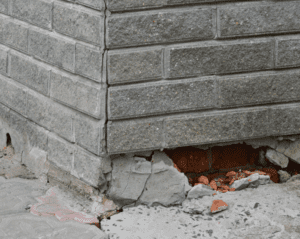Buyers ask: Will this house pass inspection?
Once buyers have found the house they wish to make their home, and have an accepted offer in place, the next step is to conduct inspections. Those inspections could include a full house inspection, as well as radon, pest, water, septic or other separate inspections. Buyers, especially first time home buyers, often ask whether their future home will “pass” inspection. And here is the answer.
Inspections are conducted solely for the use of the future home owner. In our area, the inspections are paid for by the buyer. They are done just so that the buyer will know exactly what he is buying. He’ll find out about any potential future issues, as well as those that are in evidence now. Some of the things an inspector will check out are:
Plumbing. Many inspectors let the water run for a while during the inspection to see whether there are any plumbing leaks. They will also look under sinks and in the basement to see if there are any signs of water seepage. For example, in a recent inspection, the inspector flushed a toilet on the first floor, and saw water (or something!) leaking from a pipe in the basement. In addition to checking for leaks and proper piping, they will determine whether the water heater is functional. They’ll review for leaks and determine what the setting is for the water temperature.
Grounds: Inspectors will also take a look at the outside property. Is the land sloping towards or away from the home? Is the driveway cracked? Are trees or roots growing into the home? Are the decks and patios in good shape? They’ll note anything that looks amiss.
 Foundation/House Exterior: Inspectors will also take a look at the outside of the home to see if there is missing or broken siding, evidence of pest problems, cracks in the foundation, rotten wood or other issues. They’ll look at the roof to determine the estimated age of the shingles, and whether there are areas that might need repair. Gutters are also inspected to ensure they are routing water properly.
Foundation/House Exterior: Inspectors will also take a look at the outside of the home to see if there is missing or broken siding, evidence of pest problems, cracks in the foundation, rotten wood or other issues. They’ll look at the roof to determine the estimated age of the shingles, and whether there are areas that might need repair. Gutters are also inspected to ensure they are routing water properly.
Basements/Crawl Spaces: Inspectors often need to check out some “icky” (a professional term) areas. That includes going into crawl spaces that I would have absolutely no desire to investigate. But the investigation of this level of the house is absolutely crucial because many of them do have one issue or another. Typical basements in my area usually have some sort of water issue. If any plumbing in the home is faulty, and water runs downhill, it usually ends up in the basement. There could also be seepage through the foundation, or through the ground. Inspectors will also look at insulation, sheetrock, and other parts of the basement to ensure whether everything is in good order.
Attic/Roof Structure: Are there any signs of water damage inside the roof? Is the attic flooring covered and usable? Is there insulation and if yes, what kind is it? Are the bathroom vents properly vented to the outdoors? Is the attic itself vented properly? Are there any signs of animals? These are some of the things inspectors will check out in the attic space.
Electric Service: Another important part of an inspection relates to electricity. Are the outlets all grounded and working properly? Do the GFCI outlets trip as expected, and are they in areas where they are supposed to be? What is the total amperage that is provided to the home, and is everything in the electric panel wired correctly? Is there room for growth?
Heating/Air Conditioning: Another area the inspector will review, if he can, is the air conditioning and heating of the home. The reason I said “if he can” is because if the temperature is too low or high, certain things cannot be tested. If it’s the middle of winter and only 30 degrees, there is no way the air conditioning system can be run. But the inspector will check out the furnace and other equipment, and identify any issues that may be in evidence. He’ll look for the age of mechanics, the correct piping to eliminate flue gasses, and the like.
Kitchen/Bathrooms/Interiors: Do all the appliances that are staying with the home work? Are the cabinets sturdy? Are there any issues with tiling in bathrooms? What about the grout? Are there any leaky areas? Are the windows in good shape, or are some of the seals broken? Again, the inspector is looking for anything that is currently in disrepair.
Well/Septic: Does the home have a private well and septic? If so, the inspector will check the elements of those systems to see whether there are any observable issues. If water tests are also being done (to check for bacteria or lead), the inspector will take samples. They may also do a dye test for the septic which should identify obvious problems with the septic. A more detailed septic test could be ordered separately.

Overall: This is just a sample of the things an inspector will review. After the inspection is complete, the buyer should get a report complete with photos that highlights everything the inspector reviewed. The report will be used by the home buyer in discussion with his real estate professional to determine first, do they still want to move forward with this home? If they do, are there any safety or structural issues that they wish to ask the seller to fix before moving forward? If yes, and if the seller does not want to fix them, do they still want to buy the home? These are the types of things that home buyers will use the report for. They can also use it as a roadmap for future upgrades once the home becomes theirs.
So to answer the question, “will this house pass inspection?”, there is no pass or fail grade. Inspections are conducted on behalf of the buyers, so they will know exactly what they are buying. I think it’s always a great idea to get an inspection completed, and I always recommend one. It’s a small amount of money to spend to ensure the quality of the biggest investment of a buyer’s life.
For more information regarding the inspection process, including types of repair requests and possible responses to them, see this post called Tip for Sellers-Inspection.